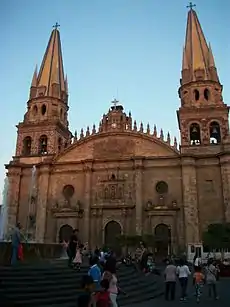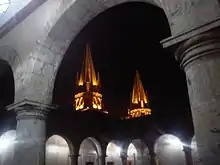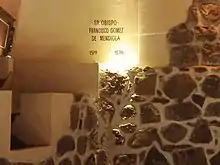Guadalajara Cathedral
The Guadalajara Cathedral or Cathedral of the Assumption of Our Lady (Spanish: Catedral de Guadalajara or Catedral de la Asunción de María Santísima), located in Centro, Guadalajara, Jalisco, is the Roman Catholic cathedral of the Archdiocese of Guadalajara and a minor basilica. It is built in the Spanish Renaissance style, except its neo-Gothic spires.
| Guadalajara Cathedral | |
|---|---|
| Cathedral-Basilica of the Assumption of Our Lady | |
 Guadalajara Cathedral | |
| Location | Guadalajara, Mexico |
| Denomination | Catholic |
| Tradition | Roman Rite |
| History | |
| Status | Cathedral, Minor basilica |
| Dedication | Assumption of Mary |
| Architecture | |
| Architect(s) | Martín Casillas |
| Style | Spanish Renaissance |
| Groundbreaking | 31 July 1561 |
| Completed | 1618 |
| Administration | |
| Archdiocese | Guadalajara |
History

The first cathedral was built in 1541 on the site of the present Templo de Santa Maria de Gracia. This primitive church was built with adobe and a thatched roof. Nevertheless, in 1548 the region was declared a diocese by the Holy See and the church became the cathedral of the city.

On May 30, 1574, during Mass, neighbors fired shots into the air. Some of the bullets fell onto the cathedral and started a fire, severely damaging the building. Work began on a new cathedral designed by master architect Martín Casillas, which was commissioned in 1561 by King Felipe II, but progressed slowly because of scarce funds. The new cathedral was completed in February 1618. Finally in April of that year, the Blessed Sacrament was moved from the former church to the new one; however, it would not be consecrated until October 12, 1716.[1] In 1818, an earthquake shook the city, causing the towers and the dome to collapse. These were replaced, but the new structures were destroyed by a subsequent earthquake in 1849. The new towers were designed by architect Manuel Gómez Ibarra. Construction took three years and cost 33,521 pesos. The new structures were completed in 1854. Pope Pius XII elevated the cathedral to the rank of a minor basilica.
Currently, the cathedral continues to be in danger: it was damaged by earthquakes in 1932, 1957, 1979, 1985, 1995 and 2003. Current threats include a slight tilt of the north tower and structural damage to the dome.
The cathedral occupies an area that is 77.8 x 72.75 meters. It contains altars dedicated to Our Lady of the Assumption, Our Lady of Guadalupe, Our Lady of Sorrows, Our Lady of Zapopan (patron saint of Guadalajara), Saint Dominic, St. Nicholas, St. Thomas Aquinas, St. Christopher and St. John of God. The altar is made of marble and silver. The stained glass was imported from France.
The cathedral houses the mummified body of Santa Innocencia (a young girl from the 1700s who, according to legend, was killed by her father for converting to Catholicism),[2] well as the remains of three cardinals and several other former bishops of the diocese, and Fr. Juan Jesús Posadas Ocampo, who was assassinated in 1993 at the Guadalajara International Airport.[1]
Gallery
 Royal Decree (Real cédula) of 1649 signed by Juan Bautista Sáenz Navarrete so that the construction of the Cathedral of Guadalajara, Mexico, is finished soon.
Royal Decree (Real cédula) of 1649 signed by Juan Bautista Sáenz Navarrete so that the construction of the Cathedral of Guadalajara, Mexico, is finished soon.




References
- "Catedral Metropolitana de Guadalajara". El Informador. 2010. Retrieved 13 January 2017.
- Chesnut, Mark. "The Mystery of the Mummy Girl in the Guadalajara Cathedral". Latin Flyer.
External links
Cathedral of Guadalajara, Mexico.
